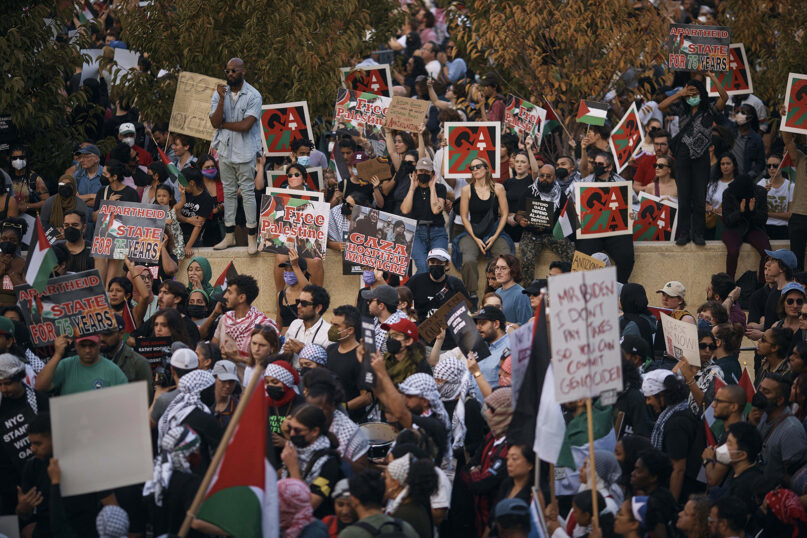Muslims calling for peace in Gaza have been answered with rampant Islamophobia
The repercussions go far beyond the current conflict overseas.
 Protesters gather during a pro-Palestine demonstration demanding a cease-fire on Saturday, Oct. 28, 2023, in New York. (AP Photo/Andres Kudacki)
Protesters gather during a pro-Palestine demonstration demanding a cease-fire on Saturday, Oct. 28, 2023, in New York. (AP Photo/Andres Kudacki)February 19, 2024
Wa'el Alzayat
(RNS) — In early February, two of America’s most prominent newspapers published bigoted op-eds about the Muslim community — one called a Michigan city “America’s Jihad Capital,” and the other compared the Middle East to the animal kingdom. Days later, a Palestinian American was stabbed by a man who attempted to remove a scarf reading “Free Palestine” and screamed a racial slur.
More recently, actress and disability rights activist Selma Blair apologized after her comment on an Islamophobic Instagram video created backlash. “Deport all these terrorist supporting goons,” Blair had said Feb. 10. “Islam has destroyed Muslim countries and then they come here and destroy minds … May they meet their fate.”
These are just the latest in a mountain of attacks against Muslim and Arab Americans since Hamas’ Oct. 7 attacks against Israel. As we have seen before, crises in the Middle East are almost always weaponized to target our communities. The Muslim civil rights group Council on American-Islamic Relations recently reported more than 3,500 complaints during the last three months of 2023, a surge of 178% over the same period in 2022.
Policymakers from both sides of the aisle have ignored the pleas of Muslim Americans to help end this hatred, rejecting the efforts of Muslim Americans to push for peace in the Middle East. Some legislators have outright fueled bigotry. Rather than calling for peace and uplifting both the Jewish and Muslim communities, they’ve opted to pit them against each other.
The repercussions will go far beyond the current conflict overseas. Every moment Islamophobia is allowed to fester, more danger is unleashed for Muslims, for marginalized communities and for the nation.
The Biden White House promised to produce a comprehensive strategy to combat Islamophobia back in November, but the administration and most members of Congress have signaled that they will simultaneously keep up their support for Israel, even as it forces the murder of tens of thousands of Palestinians in Gaza. This stance ignores polling showing Americans’ overwhelming support for a mutual cease-fire.
Indeed, the Senate just approved $14.1 billion to shore up Israel’s war, signaling to xenophobes that Muslim and Arab lives do not matter abroad, and therefore do not matter at home.
Far from acknowledging the suffering of Palestinians or pushing for a comprehensive ceasefire, some in Washington have taken to linking those calling for a cease-fire to one of the United States’ most dangerous adversaries. Former House Speaker Nancy Pelosi recently suggested that pro-Palestinian protesters could have ties to Russia and should be investigated by the FBI.
The House of Representatives recently passed a bill that would explicitly bar any person who facilitated the Oct. 7 attack on Israel from entering the United States, overlooking the fact that all terrorists are already banned from the country. As U.S. Rep. Rashida Tlaib noted, this is “just another GOP messaging bill being used to incite anti-Arab, anti-Palestinian, and anti-Muslim hatred that makes communities like ours unsafe.”
Absent a major change in policies and messaging, Islamophobia will continue to spread. Muslim Americans will experience more discrimination in the workplace, at school and elsewhere. There will likely be more violence against Muslims.
But the effects will go far beyond Muslims. We’ve seen it time and time again: When our country gives a green light to discrimination, bigots feel empowered to attack all marginalized communities.
The wave of Islamophobia could also impact the 2024 election. Rewind to nearly a decade ago, when Donald Trump led a presidential campaign rife with bigotry. His inflammatory rhetoric empowered droves of far-right conservatives to create echo chambers for hatred. Bias became a powerful turnout machine. While in office, President Trump was able to write discrimination into policy, beginning with the infamous ban on immigrants from Muslim-majority countries.
Today, a similar landscape is emerging. Far-right lawmakers and influencers are seizing the opportunity to marginalize and demonize Muslims. Trump has already promised to reinstate the Muslim ban if re-elected.
Meanwhile, Democratic lawmakers may face their worst nightmare. Beholden to a diverse coalition of voters, they can’t afford internal divisions that will suppress turnout. Many Muslim Americans have already signaled that they will not support President Biden in November, a blow to hopes that Muslim voters will help deliver crucial swing states.
Islamophobia, in other words, does not operate in a vacuum. It creates repercussions far beyond the Muslim community. It’s time our leaders took action.
(Wa’el Alzayat, a former Middle East policy expert at the U.S. Department of State, is CEO of Emgage Action, a nonprofit that advocates for just policies that strengthen America’s pluralistic democracy and protect human rights. The views expressed in this commentary do not necessarily reflect those of Religion News Service.)
No comments:
Post a Comment